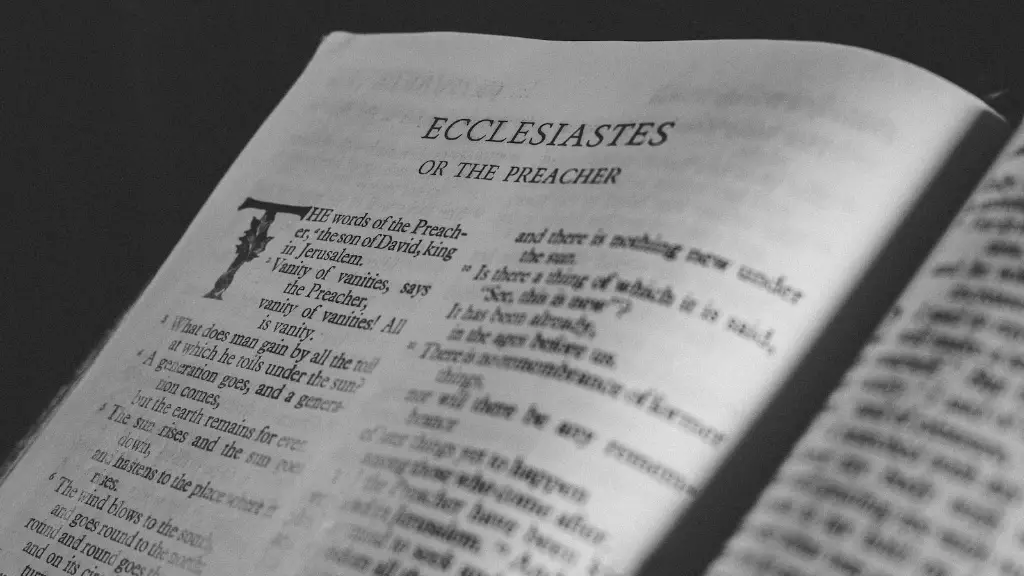What Does The Bible Say About Birth Control?
The Bible does not explicitly mention birth control, but there are a number of verses that have been used to argue both for and against it. Christian opinions on contraception vary significantly, ranging from those who are strongly in favour to those who are strongly against. Scholars have differing views on the interpretation of these verses, and ultimately the decision of whether to use birth control is a personal one.
When discussing what the Bible says about contraception, it is important to distinguish between natural and artificial methods. Natural methods, such as periodic abstinence and withdrawal, are approved by some Christian denominations, while artificial methods such as condoms, pills, or vasectomy are generally frowned upon.
Some Christians believe that the Bible commands couples to have as many children as possible. This view stems from Old Testament scripture such as Genesis 1:28, which states: “Be fruitful and multiply; fill the earth and subdue it.” While this verse implies that humans should have children, it does not explicitly forbid the use of birth control.
Other Christians argue that the Bible allows couples to make their own decisions about family planning. This interpretation is supported by New Testament passages such as 1 Corinthians 7:5-6, which states: “Do not deprive one another except with consent for a time, that you may give yourselves to fasting and prayer; and come together again so that Satan does not tempt you because of your lack of self-control.” This passage implies that couples should make decisions regarding their sexual activity together, and that contraception can be an appropriate choice.
Still other Christians believe that contraception should only be used to prevent overpopulation or to avert serious health risks. This interpretation is based on teachings such as Genesis 2:24, which states: “Therefore a man shall leave his father and mother and be joined to his wife, and they shall become one flesh.” This verse implies that couples should unite in a commitment to each other, and suggests that contraception can be used to prevent unintended pregnancies and reduce the risk of physical or emotional harm to either spouse.
The Pros and Cons of Contraception
The debate over artificial contraception is complex and multifaceted. On the one hand, some Christians argue that contraception can be used in a responsible way to limit the number of children, decrease population growth and enable couples to enjoy a healthy sex life. On the other hand, opponents of birth control may argue that contraception goes against God’s intention for marriage and life and that it can lead to promiscuity and an increase in bad behaviors.
For couples considering the use of birth control, it is important to weigh the pros and cons before making a decision. Contraception can help reduce the risk of unintended pregnancies and can potentially provide social and economic benefits for individuals and families, but it may also be associated with a range of potential negative health and emotional effects, depending on the method used. Ultimately, each couple should consult with their doctor and spiritual advisor to determine the best course of action for their unique situation.
The Church’s View on Birth Control
The Catholic Church and some other Christian denominations have long held the view that the use of artificial contraception is a sin, citing sections of scripture such as Genesis 38:8-10, which states: “And Judah said to Onan, ‘Go in to your brother’s wife and marry her, and raise up an heir to your brother.’ But Onan knew that the heir would not be his; so whenever he went in to his brother’s wife, he spilled his semen on the ground, lest he should give an heir to his brother.” This passage is often cited as an example of God’s disapproval of contraception.
Despite this, the Catholic Church has softened its stance in recent years, recognizing that modern contraception has the potential to be used responsibly and to prevent the harm resulting from unwanted pregnancies. The Church also acknowledges that in some cases, such as when a woman’s health is at risk, the use of contraception may be justified. As such, some Catholic couples have begun to practice responsible use of birth control.
The Use of Contraception in Other Religions
The use of birth control is not unique to Christianity. Other faiths, such as Islam, have also allowed the use of contraception to prevent overpopulation and to protect women’s health. Muslims, for example, often allow the use of contraception as long as it does not violate religious law.
The use of birth control is also common in traditional Judaism. Jewish scholars familiar with the Talmud state that while contraception was generally discouraged in certain circumstances, it was allowed if needed to preserve the life or health of the mother.
Alternative Methods of Birth Control
For couples who are uncomfortable with traditional forms of contraception, there are alternative methods available. Natural family planning (NFP), for example, is an approach that helps couples identify when conception is likely and when it is unlikely. NFP requires communication and commitment from both partners, but it does not involve the use of any hormones or devices.
Vasectomy is another form of contraception that involves little to no risk and is highly effective in preventing pregnancy. This procedure is considered irreversible and is used only by men seeking permanent sterilization.
Finally, alternative medicine offers a range of contraception-related treatments, including herbal remedies, acupuncture, and homeopathy. Each alternative method has its own benefits and risks, and couples should consult with a qualified healthcare provider before seeking any alternative treatment.
The Debate Over Contraception and Abortion
The debate over contraception and abortion often intersects, as some opponents of contraception argue that it encourages promiscuity and thus leads to an increase in abortions. Some religious people argue that life begins at conception, which means that any form of artificial contraception is tantamount to abortion.
On the other hand, some religious people argue that life begins at birth, which implies that contraception does not equate to abortion. Ultimately, this is a personal decision for each couple to make, and religious leaders have varying views on when life begins.
Intersection Between Faith and Family Planning
Couples who are considering the use of birth control should recognize that the choice to use contraception carries moral implications. Ultimately, whether or not to use contraception is a personal decision, and each couple should evaluate their individual beliefs and circumstances to come to an informed decision.
Couples should also be aware that the use of contraception may carry spiritual implications. While some religions promote the use of contraceptive methods, others discourage or forbid it. Couples should research and discuss their faiths with their spiritual advisors to decide what is right for them.
Birth Control in Developing Nations
Despite the ongoing religious debate, an increasing number of developing countries are recognizing the value of birth control, especially in the context of reducing poverty and improving the health of citizens. UNFPA, for example, offers family planning information and contraceptive access to women in a number of developing countries. Organizations such as this one are working to ensure that all individuals have the opportunity to make informed decisions about family planning and contribute to a better future for their countries.
A growing body of research has also found that access to and use of birth control can have a positive impact on a range of development issues, including poverty reduction, gender equality, and economic growth. Investing in family planning programs has the potential to transform lives, reduce negative environmental impacts, and improve health outcomes in the long-term.
Conclusion and Summary
In conclusion, the debate over contraception remains complex and multifaceted. What the Bible says about birth control is open to interpretation and ultimately comes down to personal belief and circumstance. Couples should also be aware that the use of contraception may carry spiritual implications, and should seek the advice of their spiritual advisors before making a final decision. Finally, contraception can provide social and economic benefits for individuals, families, and nations, particularly in the context of poverty reduction and improved health outcomes.


